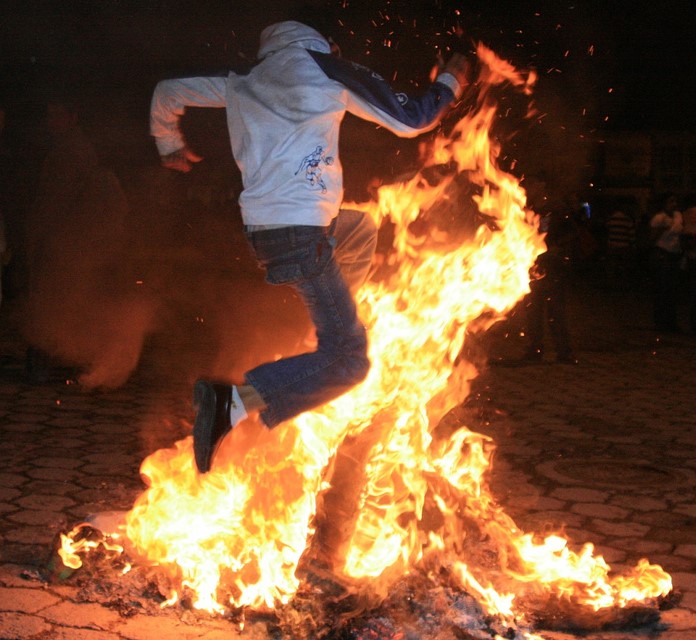I often reflect on the place of God in the 21st century. In this postmodern age of hyperrationality absent truth and meaning, it feels as if God is dying. Still, I am not yet ready – and will never be ready – to say Kaddish for God.
Each generation and individual person must struggle passionately with God and self and find our own unique way to do so, because it is not God’s life on the line, but ours.
While we don’t wrestle with emanations of God along the riverbank, like Jacob, we wrestle with the Divine each and every day – in each moment – through accepting our strength and limitation, struggling with our demons and seeing the Divine face in them, embracing life – our life – as it is with all of its complexities, and acting in the most compassionate way we know how.
Have You Only One Blessing?
The Book of Genesis is in many ways the most personal book of the Bible. It reads like an epic family drama much like the experience of family that anyone reading this post might have. Beginning with creation, the Book of Genesis tells the tale of four generations in the house of Abraham, the common ancestral family to Judaism, Christianity, and Islam, and the fathers and mothers of our fathers and mothers.
The Book of Genesis is replete with stories and sordid dramas of family conflict, sibling rivalries, envy, jealousy, greed, deception, and even murder. When God made a covenant with Abraham, God blessed Abraham and his descendants and instructed him to be a blessing (Genesis 12:2). It is with this imperative and vow does Abraham and his children and grandchildren struggle, as we do.
After Isaac was nearly sacrificed at an altar to the gods by his own father, Abraham, Isaac eventually married Rebecca and fathered twins with her, Esau and Jacob. Isaac favored Esau, their eldest, and Rebecca favored Jacob, their youngest. Rebecca was envious of Esau, and after Isaac stole Esau’s birthright, she encouraged and conspired with Jacob to steal Esau’s rightful blessing of the first born.
In a cry echoed still to this day in those lands, Esau felt betrayed by his brother and weeps to their father, Isaac, “Did you not save a blessing for me?” (Genesis 27:36). As if still laying on Abraham’s altar, Isaac was stupefied and dumbfounded and had no more blessing to offer. “What shall I do now, my son?” (Genesis 27:37). In the wake of such tragedy, Esau cries out to his father in terrible agony, “Have you only one blessing?” (Genesis 27:38).
A monk said to Tōzan, “Cold and heat descend upon us. How can we avoid them?” Tōzan said, “Why don’t you go where there is no cold or heat?” The monk said, “Where is the place where there is no cold or heat?” Tōzan said, “When cold, let it be so cold that it kills you; when hot, let it be so hot that it kills you.” (The Blue Cliff Record, Case 43, translated by Katsuki Sekida Roshi)
Wealth and Riches
After stealing Esau’s birthright and blessing, Jacob fled for his very life and settled in the land of Haran. He eventually settled there, worked on Laban’s ranch, married his daughters, Leah and Rachel, and their maidservants, Bilhah and Zilpah, and had many children with them. Jacob grew “exceedingly prosperous” (Genesis 30:43; JPS) and rich in livestock, servants, and property. In the process, Laban duped Jacob, and he in return.
Feeling cheated by Laban, his father in law, Jacob took all of his property – and some of his father in law’s, too – and decided to return home with his wives and children.
Anticipating a conflict with his brother Esau, Jacob divided all that he possessed into two camps and sent a message to Esau in hopes of assuaging his anger with the promise of some of Jacob’s possessions. Preparing for the expected confrontation, Jacob sent everyone and everything ahead of him, leaving him safely behind.
At last, Jacob was alone.
A monk, Seizei, eagerly asked Master Sōzan, “I am solitary and poor. I beg you, Master, please help me to become prosperous.” San said, “Venerable Zei!” “Yes, Master!” replied Zei. San said, “You have already drunk three cups of fine Hakka wine and still you say that you have not yet moistened your lips.” (The Gateless Gate, Case 10, translated by Koun Yamada Roshi)
Wrestling with God and Men
Life can be a struggle. Our ancestors described in the Book of Genesis have their struggles as we have our struggles. They struggle with their brothers and sisters, as we struggle with our brothers and sisters. They struggle with their demons, as we struggle with our demons. They struggle with love, as we struggle with love.
While Jacob was alone, a stranger wrestled with him all night without victory or loss. At the break of dawn, the man wounded Jacob at his hip and asked for Jacob to let him go before the morning sun rises. Jacob refused. “I will not let you go, unless you bless me” (Genesis 32:27; JPS).
The man asked Jacob his name. When he answered, “Jacob,” the man said, “You shall no longer be called the name Jacob, but Israel, because you’ve wrestled [Isra] with God [El] and men and prevailed” (Genesis 32:29). Jacob again asked the man his name, but he refused to answer and departed before the sunrise. Jacob then named that place Peniel [face of God], as “I have seen God face to face, and my life has been delivered.”
Soon after, Jacob looked up and saw Esau approaching with 400 of his men. Jacob placed his most prized possession and children closest to him and his other wives and children further away closest to Esau and his men.
Something shifted, and Jacob was then able to loosen his grip. “He himself went on ahead and bowed low to the ground seven times until he was near his brother. Esau ran to greet him. He embraced him and, falling on his neck, he kissed him; and they wept” (Genesis 33:3-4; JPS).
Jewish legend tells that the stranger with whom Jacob wrestled in the darkness of night and break of dawn was none other than Esau, Jacob’s brother. Just as Jacob wrestles with his brother and enemy – the very emanation of God – we wrestle with God in the midst of our own very life. We struggle with our brothers and sisters, enemies and friends, gods and demons. We wrestle with our pains, our imperfections, our joys, and our futures well into the dark of night and rising dawn.
Attention! Ungan asked Dogo, “What does the great compassionate bodhisattva do when she uses her manifold hands and eyes?” Dogo said, “It’s like a man who reaches behind him at night to search for his pillow.” Ungan said, “I understand.” Dogo said, “What do you understand?” Ungan said, “All over the body are hands and eyes.” Dogo said, “You’ve really said it—you got eighty percent of it.” Ungan asked, “Elder brother, how about you?” Dogo replied, “Throughout the body are hands and eyes.” (Book of Equanimity, Case 20, translated by Gerry Shishin Wick Roshi)
God is Always in Front of You
The psalmist writes, “I place God opposite me always” (Psalm 16:8). Not sometimes, when I can, occasionally, when I feel like it, when I want to, but always! We can always make contact with the Divine! We are always in relationship!
Only in wrestling with God and his brother Esau did Jacob realize that God is in front of him, too. After sending his possessions and family well ahead of him to ensure his own personal safety – and then finally dropping the load to put down all that he physically possessed – Jacob began to learn a valuable life lesson. Jacob bowed seven times to the ground. He lowered himself and gained true prosperity.
Essentially, there is no victory or defeat, no gain and no loss. Jacob shifted from struggling against Esau to struggling with him. It was only then that Jacob struggled with all parts of his life, became Israel – a God wrestler – and was able to see the true face of the Divine, face to face, just and always in front of him.
Is the person in front of you an ally? An adversary? Something else?
As perfect as we are created and born, we too often fail to see the innate perfection in others. Our task – most often, one small step at a time – is to reclaim this birthright and recognize it in others. Our task is to recognize the face of the Divine in all others, as God sees this in all and each one of us.
Wu-Tsu said, Shakyamuni and Maitreya are servants of another. Tell me, who is that other?” (The Gateless Gate, Case 45, translated by Robert Aitken Roshi)
The Blessing of Struggle
In a previous post, I mentioned that the figures in the Hebrew Bible are quite human and fallible. Unlike the heroes and gods of Greco-Roman and other mythologies, the lives and actions of our mythological ancestors are hardly ideal. But this is the point! They are not meant to be seen so.
In any important relationship, there will be struggle. In the Buddhist tradition, there are Four Noble Truths. The tradition teaches that there is both suffering in life and a remedy. We can become stuck and self-centered or spacious and kind.
We are built to connect, and likewise to care. We must struggle with a real life, living God, not a man somewhere in the skies or a vast wind or spirit, but like Jacob, with a real-life, personal, flesh-and-blood divinity embedded and embraced in the midst of our lives.
In a recent blog post written by Rev. Myogo Mary-Allen Macneil, a dharma friend and teacher at the Bodhi Oak Zen Center, Mary-Allen makes an important and necessary shift in our understanding of true compassion. She defines compassion not as “suffering with” others but as the “ability to be with suffering.”
This is the nature of meditation and spiritual practice. This is the nature of Jacob’s wrestling with the angel of God along the Jabbok River and our own struggle with the Divine and our God today. Sitting alone with others in meditation teaches us the blessing of struggle. Sitting alone with others in meditation teaches us the blessing of this very life.
As always, if you are interested in learning more about Jewish Mindfulness Meditation or how to create a more meaningful spiritual path for you and your loved ones, please make sure to sign up and click the “Stay Connected Now!” button below!
Adam Fogel
www.mindfuljudaism.com

